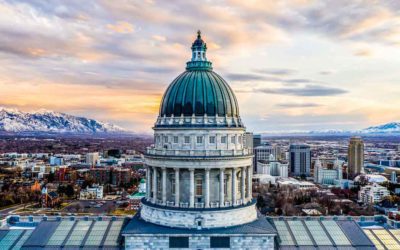
Written by William C. Duncan
May 17, 2023

The Homeless to Renter (H2R) program was spotlighted in a comprehensive 2017 report for the Baylor Institute for Studies of Religion. The program in King County, Washington, is a
partnership outside of Seattle between Jewish Family Services and Temple Beth Ann that covers move-in costs (e.g., first and last month’s rent and deposit) for potentially homeless families who would otherwise not be able to come up with the funds to get into housing. Over the past 10 years, H2R has helped over 1,000 people find housing, of which 85% were able to maintain that housing a year later.
Homelessness is a pressing concern in Utah and nationally. In 2021, 7,712 individuals in Utah experienced homelessness for the first time.
As with the H2R program, religious organizations provide a critical resource for people experiencing homelessness. In major U.S. cities, “religious organizations are providing more than half of the emergency shelter beds for homeless people.” Nearly half (48%) of religious congregations in the United States “participate in some kind of food distribution program.”
These efforts are not always popular, however. The city of Santa Ana, California, has been sued for attempting to prevent a religious organization called Micah’s Way “from providing food and drink to the homeless.” Court filings explain that the organization is “named after the ‘Micah Mandate’ set forth in Micah 6:8 in the Bible,” which “requires followers ‘[t]o act justly, and to love mercy, and to walk humbly with your God.’” The organization believes it “‘has a religious duty to help the homeless that come to it … including by providing a cup of coffee and a muffin if a client is hungry.’”
Micah’s Way initially provided service indoors, but during the pandemic, it moved its operations outdoors, which created some concern with residential neighbors. These concerns were exacerbated by a needle exchange program operating close by. In response to neighbor complaints, the city’s mayor sought to limit or close the food distribution ministry. Eventually, Micah’s Way moved its services back indoors, but the city has threatened fines and citations, refusing to give the group a certificate of occupancy which would make its operations legal.
Congress has recognized that land use disputes are a common source of church-state conflicts. For instance, restrictive zoning laws and hostile local governments have blocked congregations from building mosques or churches, or unfairly curtailed the use of religious property. In 2000, Congress unanimously approved the Religious Land Use and Institutionalized Persons Act to prevent some of these problems.
The law prohibits governments from creating or enforcing “a land use regulation in a manner that imposes a substantial burden on the religious exercise of a person, including a religious assembly or institution” unless the government can show that the burden advances a compelling interest (like protecting public health or safety) in a way that does not unnecessarily impact other rights.
In the dispute with Santa Ana, the U.S. Department of Justice has weighed in on the side of Micah’s Way. The DOJ argues that “distribution of food and drinks to homeless individuals” is religious exercise protected by the law and that the city decision not to allow distribution is a “substantial burden” on that exercise. The burden is particularly onerous because the city has said it “‘will not entertain’ any conditions short of [Micah’s Way] shuttering its food and beverage service.”
Of course, the city is still free to show that the program creates a danger to the community. Religious claimants do not always win these cases. This one, however, looks like an easy case. Religious freedom, in instances like this, can mean the difference between securing needed help for the homeless or leaving them to fend for themselves on the streets. That should be a simple choice.

Insights: analysis, research, and informed commentary from Sutherland experts. For elected officials and public policy professionals.

- Religious organizations provide crucial resources to help individuals who are homeless.
- These efforts can be hampered by government actions that limit the ability of people of faith to provide help.
- Federal laws and agencies are working to give religious organizations space to do their crucial work.
Read More
Is California’s minimum wage hike a mistake?
Is raising the minimum wage a good tool to help low-income workers achieve upward mobility? That’s the key question at the heart of the debate over California’s new $20 an hour minimum wage law for fast food workers.
Why is Utah at odds with Justice Department over treatment of gender-dysphoric prisoner?
Lawsuit illustrates a little-known practice of federal agencies – giving various forms of “guidance” which are not supposed to be legally binding. The practice raises serious legal and constitutional questions.
What would a parent-teacher ‘handshake’ look like in Utah?
This partnership does not allow either party to pass blame entirely to the other. There is no scapegoat, only opportunities for either party or both to work on the factors within their scope.


